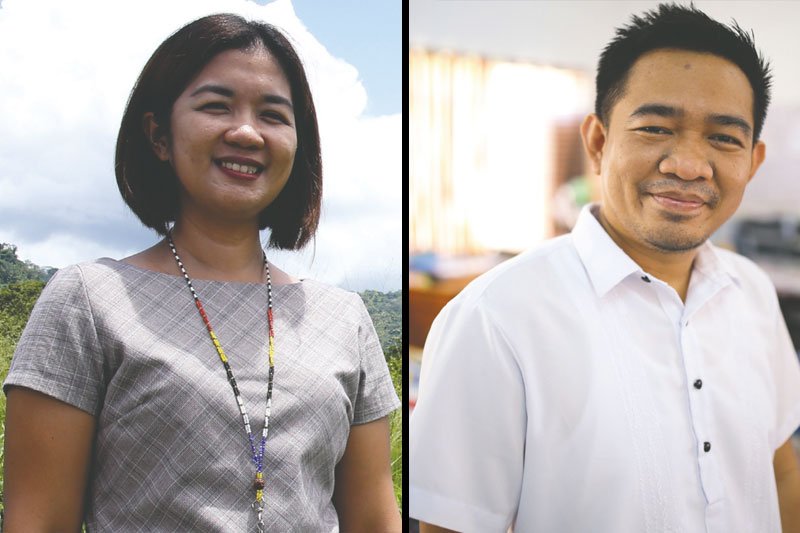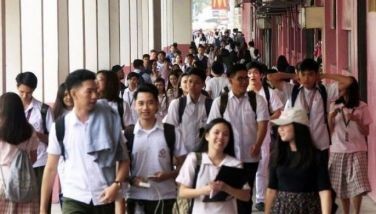Educators bring science closer to the community

Aimee Lynn Dupo and Ronaldo Reyes
Studying chemical reactions and identifying different species of spiders are tasks that would not appear on many people’s bucket list.
But for educators Aimee Lynn Dupo and Ronaldo Reyes, it is part and parcel of who they are. In fact, they have made it their mission to bring these oft-avoided scientific concepts closer to students and the general public.
Dupo and Reyes are two of the four honorees of this year’s Many Faces of the Teacher campaign, an initiative of Bato Balani Foundation and Diwa Learning Systems that pays homage to educators whose teaching feats help transform students and communities.
The honorees were chosen among hundreds of teachers who went beyond their duties inside the classroom to contribute to nation-building by sharing knowledge and opening opportunities to students of all ages.
Growing up in a family of arachnologists, or scientists who study spiders, Dupo never had a problem dealing with what many consider as creatures straight from someone’s nightmare.
For years, she spent considerable time and effort with her parents learning about these eight-legged creatures.
“I have always been exposed to the field,” she says. “You cannot ignore it because over time, you will learn that they have a direct impact on our lives.”
Now a curator of the University of the Philippines Los Baños Museum of Natural History, Dupo has since expanded her research to cover moths, which she said is an “underdog” when compared to its close relatives, the butterflies.
She was recently appointed as head of the Bee Program of the UPLB’s Institute of Biological Sciences, leading efforts to provide science-based livelihood training and skills development program for bee farmers.
Because of her contribution to the field, a French scientist named after her a moth species, Cleora aimeelynnae, that was discovered in Benguet in 2012.
Asked why she wanted to study animals that are often taken for granted by the public, Dupo said spiders, moths and bees play a role in the ecosystem that have a direct impact on humans.
“Spiders, for example, are predators. They’re very important in monitoring and regulating pest populations such as mosquitoes… If I don’t want my child to get dengue, I have to study ways to regulate the mosquito population. How do I do that? I look at the predators,” she said.
In the case of bees, she said they function as pollinators of food that humans consume.
“If I want to make sure that food is on the table, I have to prioritize the presence of pollinators because a third of what we eat comes from pollinators,” she added.
Dupo said they are also providing capacity-building training sessions to provide those in the academe and in the communities an environment of awareness and appreciation for wildlife.
For his part, chemistry teacher Ronaldo Reyes of the Tabaco National High School in Albay said it has always been his vision to make more people understand the subject he teaches beyond abstract concepts such as atoms and chemical reactions.
“Chemistry is one of the science subjects that is difficult to understand considering its abstract nature,” he said in Filipino. “Some people, especially those in the community, don’t know its applications in real life.”
To address this, Reyes and his co-teachers and students started in 2013 a project called the ChemConnect, an initiative that promotes science literacy to marginalized communities in Albay.
“One example is to promote the responsible use of common household chemicals (like muriatic acid and chlorine),” he said, noting that these can cause a variety of illnesses if improperly used.
Reyes said the project also became a venue for them to test science investigatory projects of the students, for instance the development of a biofuel from hog manure and other solid waste.
“One of my missions as a teacher is to promote research culture among the students… It gives me fulfillment seeing them come up with products that benefit the community,” he added.
With ChemConnect, Reyes said their students and the people in the community now have a better understanding of chemistry and its role in their lives.
(Next week: Learn about a teacher who strives to preserve her tribe’s culture, and an educator who turned a prison into her classroom.)
- Latest
- Trending























